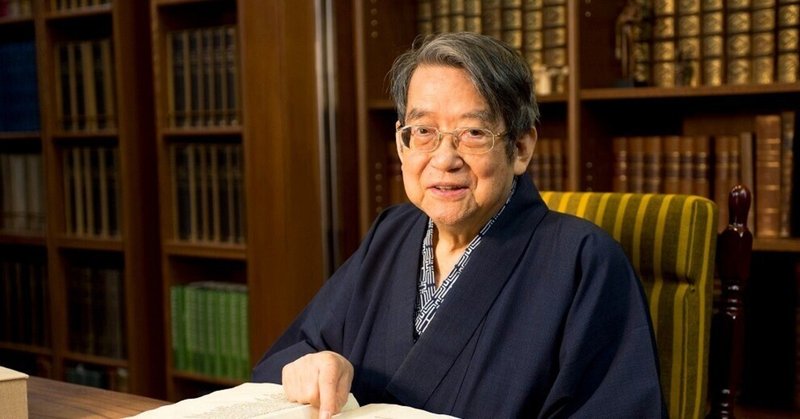
「知の巨人」渡部昇一〈しょういち〉3 “A Giant of Knowledge”, Shoichi Watanabe 3
「知の巨人」渡部昇一〈しょういち〉3
(3)渡部昇一の業績・著書(2)
政治・歴史に関する評論に関して、保守系オピニオン誌である『正論』(1958のち文庫)は心に残っています。参議院議員平泉(ひらいずみ)渉(わたる)が一九七四年自民党政務調査会として「英語教育改革試案」をまとめ、公聴会で意見を求められた事もある渡部昇一が、雑誌「諸君!」に批判文を掲載し、『英語教育大論争』(文藝春秋、1975年 のち文庫、平泉渉共著)を生みまし。元外交官で仏語に堪能な平泉渉が応じ、五回にわたって英語教育論が展開。渡部昇一の主張は、近代西欧文明を享受できたのは複雑な原文でも正確に読める伝統的英語教育に依ったからで、顕在力を養うのは、高校までに潜在力を仕上げた後の問題(平泉のアテネ・フランセ通いも同じ)であるといい、英語精読力の無い英米育ちの高校生は多い等という批判でありました。経済界、PTAは平泉を支持し、現場の教師は批判的で、論争の反響は大きいものがありました。
渡部昇一は、高校日本史教科書の検定で、当時の文部省が「侵略」を「進出」に書き換えさせたとする新聞・テレビ各社の報道を誤報だといちはやく指摘し、ロッキード事件裁判では田中角栄元首相を擁護するなど、論壇で華々しく活躍。一連の言論活動で「正確な事実関係を発掘してわが国マスコミの持つ付和雷同(ふわらいどう)性に挑戦し、報道機関を含む言論活動に一大変化をもたらす契機となった」として第一回正論大賞を受賞。東京裁判の影響を色濃く受けた近現代史観の見直しを主張するなど、保守論壇の重鎮(じゅうちん)であった。主な著書に『日本史から見た日本人』『ドイツ参謀本部』など。フランシス・フクヤマ『歴史の終わり』など翻訳も多数あります。
二0一二年三月、『人は老いて死に、肉体は亡びても、魂は存在するのか?』と題する本を出版。この本で渡部昇一は、驚くことに「スピリチュアリズムは崇高な思想である」という画期的な発言をしています。大半の知識人のスピリチュアリズムに対する見方は、暗い世相を反映した社会現象の一つであるといった批判的なものです。宗教的世界への深い洞察力を持っている知識人でも、ことスピリチュアリズムとなると、怪しげな神秘主義た・オカルトという程度の見解に終わってしまう。日本の知識人の中で本当にスピリチュアリズムを評価できる人物は当分現れないだろうと思っていました。しかし、渡部昇一のこの一冊によってそうした状況が打破されました。
“A Giant of Knowledge”, Shoichi Watanabe3
(3) Shoichi Watanabe's Achievements and Books (2)
Regarding political and historical commentary, the conservative opinion magazine “Seiron “(later published in paperback in 1958) remains in my memory. In 1974, Wataru Hiraizumi, a member of the House of Councilors, compiled the "English Education Reform Proposal" as part of the Liberal Democratic Party's Political Affairs Research Committee, and Shoichi Watanabe, whose opinion was asked for during public hearings, published the magazine "Gentlemen! '' and published ``The Great English Education Controversy'' (Bungei Shunju, 1975, later published in paperback, co-authored with Wataru Hiraizumi). Wataru Hiraizumi, a former diplomat and fluent in French, responded and presented his theories on English education over five sessions. Shoichi Watanabe argues that the reason we were able to enjoy modern Western civilization was because we relied on traditional English education that allowed us to read even complex original texts accurately, and that cultivating expressive ability is a matter of developing latent ability by high school ( The same is true for those who attend the Athénée Français in Hiraizumi), and criticism has been that there are many high school students raised in Britain and America who cannot read English well. The business community and the PTA supported Hiraizumi, and teachers on the ground were critical, and the controversy had a large impact.
Shoichi Watanabe was quick to point out that newspaper and television reports that the Ministry of Education at the time changed the word "invasion" to "advancement" in the certification of high school Japanese history textbooks were false reports, and in the Lockheed Incident trial, former Prime Minister Kakuei Tanaka He was active in the debate arena, including defending the series of speech activities "unearthed accurate facts and challenged the Fuwarai-do (uniformity) of our country's media, and served as an opportunity to bring about a major change in speech activities, including those of news organizations. He won the Seiron Grand Prize once. He was a leading figure in conservative circles, advocating a review of modern historical views that were strongly influenced by the Tokyo Trials. His major books include ``Japanese from the Perspective of Japanese History'' and ``German General Staff.'' There are many translations, including Francis Fukuyama's ``The End of History.''
In March 2012, he published a book entitled If People Grow Old and Die and Their Bodies Die, Do Their Souls Still Exist?''. In this book, Shoichi Watabe surprisingly makes the groundbreaking statement that ``Spiritualism is a sublime ideology.'' Most intellectuals have a critical view of spiritualism, viewing it as a social phenomenon that reflects the dark times of society. Even intellectuals with deep insight into the religious world end up viewing spiritualism as nothing more than dubious mysticism or the occult. I thought that among Japanese intellectuals, there would be no one who could truly appreciate spiritualism for some time. However, this one book by Shoichi Watanabe broke that situation. (To be continued)
この記事が気に入ったらサポートをしてみませんか?
